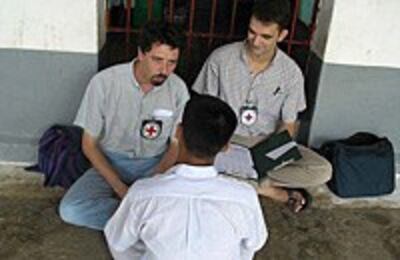
BANGKOK—Burma’s military junta is blocking regular visits by representatives of the International Committee of the Red Cross (ICRC) and putting pressure on them to work in tandem with local groups approved by officials.
We need to be able to conduct our assessments of what goes on and the physical conditions in the prisons independently of any organization or of the government.
“We have had no authorization to visit prisons or labor camps since the end of last year,” ICRC spokeswoman Fiona Terry told RFA’s Burmese service.
“We’ve been trying to discuss with the relevant authorities about restarting the detention activities…We’ve hopefully only been temporarily suspended.”
Terry said the ICRC was continuing to give assistance to the families of prison inmates, so that they were able to visit their relatives in prison, but was unsure how long this would be possible without direct contact with the prisoners themselves.
She said it was unclear precisely why authorization was being withheld, at a time when the entire Burmese government is in the process of relocating to the country’s new administrative capital, Pyinmana.
“Of course we are concerned about the repercussions for the detainees of not having ICRC visiting them, but we are at this stage still optimistic,” she said.
Burmese government officials have repeatedly requested that ICRC representatives visit prison inmates alongside local organizations such as the Women’s Federation, but the ICRC has refused.
“We need to be able to conduct our assessments of what goes on and the physical conditions in the prisons independently of any organization or of the government,” Terry said.
“That then enables us to have a completely objective view of what’s going on and to be able to share our findings with the government. So that’s what we can not really accept, is to be accompanied in the prison by any other organization.”
ICRC believes that the best way that it can prevent or halt torture and ensure decent conditions of detention is by getting repeated and unrestricted access to prisoners, talking to them about their problems, and urging the detaining authorities to make any improvements that may be necessary.
Negotiated access
The price of this is a policy of confidentiality, taking up the problems only with the people directly concerned.
According to the ICRC’s Web site, most of the prisoners ICRC visits or seeks to visit aren't protected by laws that oblige the authorities to open the gates—access must be negotiated.
The organization typically visits prisoners of war, civilians interned in the course of armed conflict, and opposition supporters who may or may not have taken violent action against the authorities.
Its aims are to prevent torture and "disappearance" and to safeguard minimum living conditions for those in prison.
In its 2006 World Report, Human Rights Watch said that "despite promises of political reform and national reconciliation, Burma’s authoritarian military government, the State Peace and Development Council (SPDC), continues to operate a strict police state and drastically restricts basic rights and freedoms."
"Hundreds of thousands of people, most of them from ethnic minority groups, continue to live precariously as internally displaced people. More than two million have fled to neighboring countries, in particular Thailand, where they face difficult circumstances as asylum seekers or illegal immigrants," the report said.
"The removal of Prime Minister General Khin Nyunt in October 2004 has reinforced hard-line elements within the SPDC and resulted in increasing hostility directed at democracy movements, ethnic minority groups, and international agencies."
Original reporting by RFA’s Burmese service. Written in English by Luisetta Mudie and edited by Sarah Jackson-Han.
